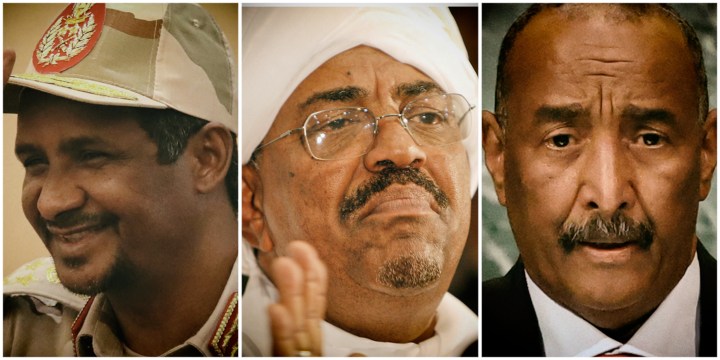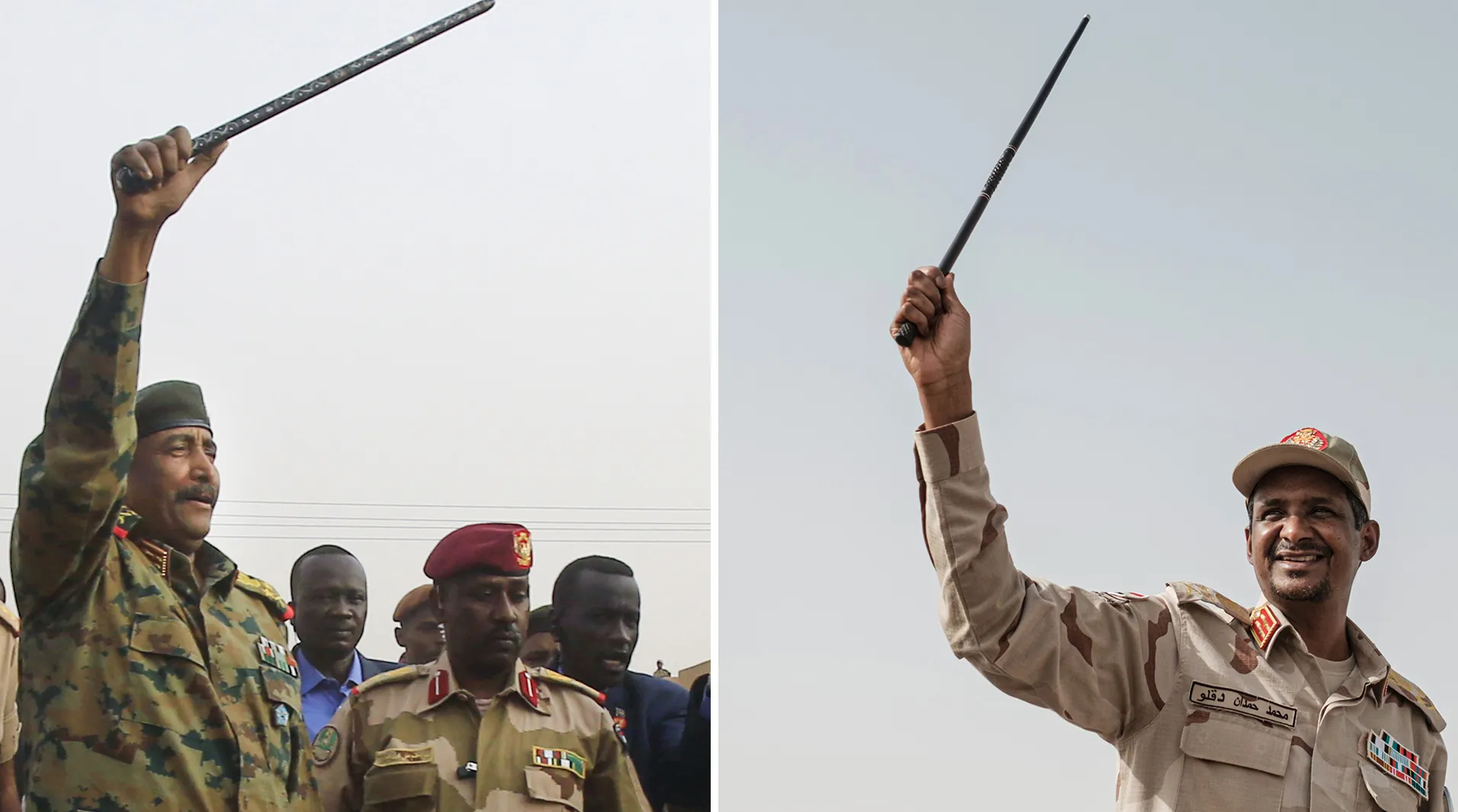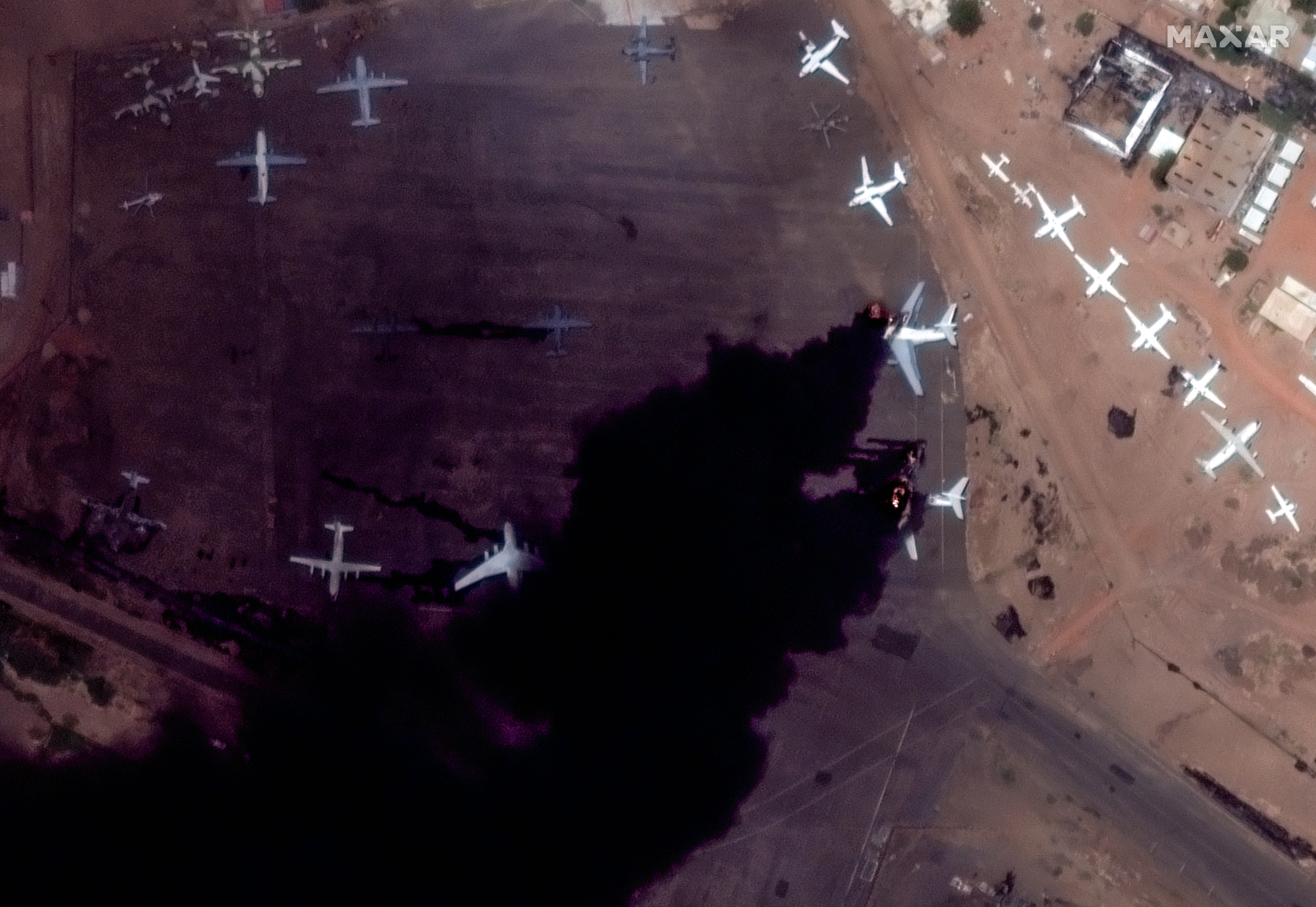EXPLAINER
Bloody war rages on in a battered Sudan as corrupt and ambitious warlords fight for might and Mammon

Two rival Sudanese military generals, Abdel Fattah al-Burhan, commander of the Sudanese Armed Forces (SAF) and Mohamed Hamdan Dagalo (better known as Hemedti), commander of the paramilitary Rapid Support Forces (RSF) have been fighting a ferocious pitched battle through their two armies in the capital Khartoum and elsewhere in Sudan since Saturday morning 15 April 2023. The death toll has now risen well above 500 with thousands injured, according to the World Health Organization.
What are the origins of this clash?
The roots go deep into Sudan’s post-independence history which has been dominated by the military. But more immediately one can trace the origins to a deliberate divide-and-rule policy practised by former President Omar al-Bashir, a former general who came to power in a coup in 1989. Fearing he could suffer the same fate, in 2013 he transformed Hemedti’s notorious Janjaweed militia, which had committed many terrible atrocities against civilians in the western region of Darfur, into the more formal paramilitary RSF. The apparent idea was to fragment the military by setting up the RSF as a counterweight to the Sudanese Armed Force, and thereby diminish any threats to his rule.
Did Bashir’s divide-and-rule tactics succeed?
No, they failed spectacularly. In early 2019, months of massive popular protests by civilians – eventually led by the broad pro-democracy umbrella body, Forces of Freedom and Change (FFC) – against Bashir’s corrupt and repressive rule, seriously destabilised his government. Burhan and Hemedti – the two commanders he had tried to set against each other – delivered the coup de grace in April by jointly removing Bashir from power. But the seeds of rivalry Bashir had sown between them continued to germinate.
Did Sudan’s popular revolt – sometimes referred to as a delayed Arab Spring – succeed?
It hasn’t so far and its prospects are now looking particularly grim, although, theoretically, it might still succeed. After Bashir’s ouster, the pro-democracy activists, mainly led by the FFC, continued their protests against Burhan and Hemedti’s new military rule through a Transitional Military Council. Some of the protests, including sit-ins outside military headquarters, were violently suppressed, sparking regional and international outrage. In August 2019 the Transitional Military Council transferred power to a joint military-civilian Sovereignty Council, though Burhan remained its chairperson and Hemedti his deputy. Its supposed purpose was to govern Sudan through a transitional period to elections and full democratic civilian rule.

This file picture composite shows General Abdel Fattah al-Burhan (L), the head of Sudan’s ruling military council, greeting his supporters in Khartoum’s twin city of Omdurman on 29 June 2019 and Sudanese paramilitary commander Mohamed Hamdan Dagalo raising a cane during a meeting with his supporters in Khartoum on 18 June 2019. (Photo: Yasuyoshi Chiba and Ashraf Shazly / AFP)
What happened to the transition to civilian rule?
It was frustrated by Burhan and Hemedti who clearly did not want to surrender the power they had gained in April 2019 or, as many people believe, the vast business interests they had both accumulated even before then. In August 2019 the new Sovereignty Council appointed a respected public administrator, Abdalla Hamdok, as transitional Prime Minister. The negotiations between the pro-democracy activists led by the FFC continued, but relations between the civilian and military components of the transitional government deteriorated because of the intransigence of the military leaders.
How did the power-sharing government pan out?
Not well. Burhan and Hemedti continued to block progress towards real civilian rule. In October 2021 the simmering tensions between the military and civilian leaders came to a head, and Burhan and Hemedti seized unambiguous power, removing Hamdok from office, in a second coup d’etat.
Did that coup kill the transition to democracy?
It was a powerful blow, but it did not quite finish off the pro-democracy movement. Protests and negotiations continued and in December 2022 a new framework agreement was signed by Burhan, Hemedti and the FFC to launch a new transition, under the control of a joint military-civilian transition, towards civilian democratic rule. The transition would start in April 2023 and would last for two years.
Why didn’t that transition start?
The December 2022 Framework agreement stipulated that Hemedti’s RSF should be absorbed into the regular Sudanese Armed Forces. But it did not say how long this process should take. Burhan insisted it should happen in two years, the period of the transition. Hemedti disagreed, insisting that he would only do it gradually, over 10 years. This sharp disagreement heightened the already growing tensions and rivalry between the two generals, which exploded on Saturday 15 April in a pitched battle between their soldiers in the capital Khartoum, the western region Darfur and other parts of Sudan. Neither side has shown any restraint and the SAF, for instance, has used military jets to bomb and strafe RSF positions in Khartoum, killing many civilians in “collateral damage”.
Who has the upper hand?
No one seems sure. The two sides appear to be quite equally matched which is bad news for Sudanese civilians because it has sustained the fighting for over two weeks already and might sustain it for much longer. Some outside estimates had put the strength of the SAF at over 100,000 soldiers and the RSF at about 40,000. But it seems the RSF has quietly recruited many more fighters than that, possibly giving it a force as big, if not bigger than, the SAF.
How are civilians faring?
Extremely badly. Previous civil fighting in Sudan has mostly been in the hinterland. This time the warfare has been fierce also inside Khartoum. Many civilians have been killed in the crossfire and many more have been trapped and are running out of food and water. Bodies are being left in the streets, aggravating the health hazard. About two thirds of Khartoum’s hospitals have closed and the rest are short of supplies. Many foreign governments, including South Africa, have managed to evacuate most of their nationals and this withdrawal of foreigners has been another blow to Sudan. But Sudanese remain in dire peril.
Has any humanitarian help been forthcoming?
Some brave Sudanese medical workers and other humanitarians have been doing their best in trying conditions to help the victims. The International Committee of the Red Cross (ICRC) announced that eight tonnes of humanitarian cargo, including surgical material for Sudanese hospitals, had departed from Amman, Jordan to Port Sudan on the Red Sea. However the ICRC also said it was still negotiating safe passage for this aid from Port Sudan to Khartoum and other centres of conflict.

This handout satellite image courtesy of Maxar Technologies taken on 16 April 2023 shows two Il-76 transport aircraft on fire and several additional planes damaged at the Khartoum International Airport. (Photo: AFP / Satellite image ©2022 Maxar Technologies)
How is this going to end?
It’s hard to say. One of the dangers is that it widens from a dispute between two corrupt and ambitious rival generals into a civil war that sucks in tribes, armed rebel groups in areas like Darfur, religious groups and others. Hemedti and others accuse Burhan of representing the interests of the Islamists who have always been a factor in Sudanese politics. Some fear an ethnic conflict as Burhan is a member of the Khartoum urban elite while Hemedti belongs to the Mehriya tribe of Darfur and most of the rest of the RSF belong to that or other tribes which, being on the periphery, have long complained of marginalisation. Several rebel armed groups especially in Darfur could be reactivated.
Could the fighting spread beyond Sudan?
This is a volatile region and so that danger can’t be ruled out. And other countries were already involved before this fighting broke out. Egypt in particular was providing military support to Burhan’s SAF. During the first few days of the fighting Hemedti’s RSF captured some Egyptian military aircraft and personnel. This raised fears of a full-scale Egyptian intervention but Hemedti’s promise not to harm the Egyptians seems to have averted that possibility. Saudi Arabia and the United Arab Emirates also have considerable interests in Sudan, largely because of its strategic location on the Red Sea. Both are believed to favour Hemedti, though they will now probably wait to see which way the wind blows. Russia is also widely seen as backing Hemedti, through the state-backed Wagner private security company which may be providing military muscle to Hemedti in exchange for gold and other mineral resources. Other neighbouring countries could intervene for fear the violence could spill over the borders. Some analysts fear Sudan could become another failed state like Somalia.
What is the international community doing to try to end the fighting?
The United Nations representative in Sudan, Volker Perthes, has been talking to both Burhan and Hemedti and has so far managed to negotiate a few brief humanitarian pauses in the fighting to allow civilians to receive food, water and medical treatment. Perthes has said he hopes such humanitarian truces could evolve into a wider ceasefire. But the brief truces have broken down before time.
The Trilateral Mechanism, comprising the UN, African Union and the Intergovernmental Authority on Development (IGAD) which represents countries in the region, as well as the “Quad” countries – the US, UK, Saudi Arabia and the United Arab Emirates – which have been trying to guide Sudan’s transition, and the Arab League, have all discussed interventions.
The most promising was a decision by an IGAD summit on 16 April to send three of its presidents; Kenya’s William Ruto, South Sudan’s Salva Kiir and Djibouti’s Omar Guelleh to Khartoum to meet Burhan and Hemedti and persuade them to lay down arms. But the three presidents could not reach Khartoum in part because the international airport had been bombed and was no longer functioning.
Instead a decision was made to bring representatives of the SAF and RSF to South Sudan’s capital, Juba, for peace talks on Friday 27 April. While the Trilateral Mechanism and Quad welcomed the meeting, it apparently did not take place. Burhan said the SAF had agreed in principle to meeting with the RSF but SAF didn’t go to Juba because Hemedti had not agreed to meet. These talks, if they happen, could instead be held in Saudi Arabia. So the war rages on with occasional brief ceasefires that quickly break down. DM


















 Become an Insider
Become an Insider
Comments - Please login in order to comment.